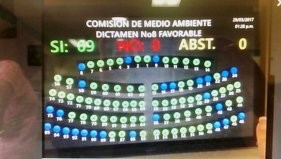On 29 March 2017, the Legislative Assembly of the Republic of El Salvador adopted a law prohibiting all activities of exploration, exploitation and processing of metals in the country. It also cancels all administrative processes relating to the requests of licences and permits to conduct activities relating to metal mining. This law is inspired by a proposal initially presented to the Legislative Assembly by the Archbishop of San Salvador, José Luis Escobar Alas. The law seeks to protect public health and the fragile environment of El Salvador from the threats caused by metal mining.
The adoption of this law is a major victory for the Mesa Nacional Frente a la Minería Metálica, a network of organisations, individuals, religious, and academics who has been advocating for years in favour of the prohibition of metal mining.
The Justice, Peace and Integrity of Creation Office of El Salvador, Franciscans International’s (FI) main partner in the country, is an active member of the Mesa Nacional. At the United Nations in Geneva, Franciscans International informed the Special Rapporteurs on environment, health, water and sanitation, and food about the positive initiative of the Legislative Assembly of El Salvador and asked them to monitor the implementation of the law.
In the future, Franciscans International will continue collaborating with the Justice, Peace and Integrity of Creation in El Salvador and with Mesa Nacional on mining-related issues. FI will also seek to foster exchanges among its partners in the Americas, Africa and Asia-Pacific, and share with them best practices, such as the new anti-mining legislation adopted in El Salvador.










